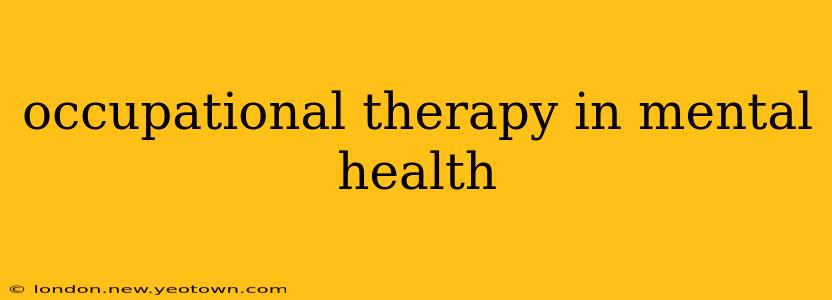Occupational therapy (OT) plays a vital, often understated, role in mental health recovery. It's not about fixing broken bones or regaining physical function in the traditional sense; instead, it's about helping individuals regain control over their lives and find meaning and purpose within their daily routines. Think of it as a bridge connecting mental wellbeing with everyday activities. This journey often starts with understanding the individual's unique challenges and crafting a tailored path towards greater independence and a sense of accomplishment.
What is Occupational Therapy in Mental Health?
Occupational therapy in mental health focuses on the connection between a person’s mental health and their ability to participate in meaningful daily occupations. These occupations are the things we do every day, like getting dressed, cooking meals, working, socializing, or pursuing hobbies. When mental health challenges arise, these everyday activities can become difficult or even impossible to manage. An occupational therapist (OT) works with individuals to identify these challenges, develop strategies to overcome them, and foster a greater sense of control and self-efficacy.
How Does Occupational Therapy Help with Mental Health?
The approach is holistic, addressing the whole person—mind, body, and spirit. OTs use various techniques, including:
- Activity analysis: Breaking down tasks into smaller, more manageable steps.
- Skill building: Developing coping mechanisms for stress, anxiety, and depression.
- Adaptive strategies: Finding ways to modify tasks or environments to make them easier to manage.
- Graded exposure: Slowly reintroducing individuals to activities they've been avoiding.
- Social skills training: Improving communication and interaction skills.
- Sensory regulation: Understanding and managing sensory sensitivities.
- Self-care promotion: Developing routines and strategies for personal hygiene and self-care.
What Conditions Does Occupational Therapy Address in Mental Health?
Occupational therapy proves beneficial for a wide range of mental health conditions, including:
- Depression: Helping individuals regain motivation and engage in activities that bring them joy.
- Anxiety: Developing coping mechanisms for managing anxiety and panic attacks.
- Post-traumatic stress disorder (PTSD): Creating a sense of safety and control through mindful activities and trauma-informed care.
- Schizophrenia: Improving daily living skills and social participation.
- Bipolar disorder: Managing daily routines and mood fluctuations.
- Eating disorders: Restoring healthy eating habits and promoting body image acceptance.
- Addiction: Developing coping mechanisms and strategies for relapse prevention.
What Does an Occupational Therapy Session Look Like?
Each session is tailored to the individual's needs and goals. It might involve:
- Assessment: Understanding the individual's strengths, weaknesses, and challenges.
- Goal setting: Collaboratively establishing achievable goals.
- Activity planning: Designing activities to address specific challenges.
- Skill practice: Rehearsing new skills in a safe and supportive environment.
- Feedback and support: Providing encouragement and guidance throughout the process.
What are the Benefits of Occupational Therapy for Mental Health?
The benefits extend far beyond simply managing symptoms. OT helps individuals:
- Increase independence: Regaining control over their daily lives.
- Improve self-esteem: Building confidence through accomplishment.
- Reduce stress and anxiety: Developing coping mechanisms and stress management techniques.
- Enhance social participation: Improving social skills and interactions.
- Increase overall quality of life: Finding meaning and purpose in daily life.
How Can I Find an Occupational Therapist for Mental Health?
Many resources can help you find a qualified occupational therapist specializing in mental health. Your primary care physician, psychiatrist, or therapist can provide referrals. You can also search online directories or contact your local mental health organizations.
Is Occupational Therapy Covered by Insurance?
Insurance coverage for occupational therapy varies depending on your plan and provider. It's essential to check with your insurance company before starting treatment to understand your coverage.
What is the Difference Between Occupational Therapy and Other Mental Health Therapies?
While occupational therapy complements other therapies like psychotherapy and medication, its unique focus is on the practical application of skills and strategies in everyday life. It addresses the “doing” aspect of mental health recovery, whereas other therapies may focus more on the “thinking” and “feeling” aspects. Think of it as a collaborative approach, working hand-in-hand with other treatment modalities for optimal outcomes.
Through a personalized approach and a focus on meaningful engagement, occupational therapy serves as an invaluable tool in the journey towards mental wellbeing, empowering individuals to live fulfilling and meaningful lives.

